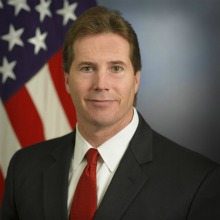
Meet Gary Winkler, the CEO at Cyber Solutions & Services, Inc. Winkler has had an interesting career working for the Department of Defense and knows a great deal about the federal contracting industry. When he left the DoD Winkler decided to begin a new chapter by starting his own company, Cyber Solutions & Services, Inc. Winkler say’s the DoD is still figuring out how to task organize it’s policies and procedures to handle cyber threats at all levels of intensity.
“Advances in mobile technology will, and already have, had a profound effect on DoD”
WashingtonExec recently had the opportunity to interview with Winkler. In this exclusive interview he spoke to us about his career at the Department of Defense and why he thinks cyber solutions will change the federal contracting industry forever.
WashingtonExec: Please tell us a little bit about your background and time at the Department of Defense.
Gary Winkler: Well, going way back, my dad was an Air Force pilot, Mom was a Navy Civilian, so you could say that Government/DoD service is in my DNA, and my family is “joint”! During my college years, I was an intern with the Federal Emergency Management Agency, and then with the Department of the Army working as an Engineering Technician. After graduate school, I went to work for a large defense contractor in Dallas, TX, and then moved to the D.C. area to work for smaller defense contractors until in-sourced as a computer engineer by the Army in 1989. I was working joint intelligence programs for a while, and then moved to working joint logistics programs. After a HQ’s Army staff assignment, I was fortunate to be selected for two consecutive Program Manager assignments on major defense acquisition programs, separated by a year at the Industrial College of the Armed Forces where I got a Master’s Degree in National Resource Strategy with a dual concentration in the Senior Acquisition and Information Strategies programs. Then, having been a career information technology and acquisition person, the Army CIO/G-6 selected me to join the ranks of the Senior Executive Service to be in charge of Army IT/IM policy, IT acquisition, IT workforce development, and knowledge management. My final assignment brought me back to PEO EIS, where I had previously served in two Program Manager assignments.
graduate school, I went to work for a large defense contractor in Dallas, TX, and then moved to the D.C. area to work for smaller defense contractors until in-sourced as a computer engineer by the Army in 1989. I was working joint intelligence programs for a while, and then moved to working joint logistics programs. After a HQ’s Army staff assignment, I was fortunate to be selected for two consecutive Program Manager assignments on major defense acquisition programs, separated by a year at the Industrial College of the Armed Forces where I got a Master’s Degree in National Resource Strategy with a dual concentration in the Senior Acquisition and Information Strategies programs. Then, having been a career information technology and acquisition person, the Army CIO/G-6 selected me to join the ranks of the Senior Executive Service to be in charge of Army IT/IM policy, IT acquisition, IT workforce development, and knowledge management. My final assignment brought me back to PEO EIS, where I had previously served in two Program Manager assignments.
WashingtonExec: What made you want to start your own business? How is it going? How does it compare to your time in the federal government?
Gary Winkler: Starting my own business was not my initial thoughts when contemplating leaving Federal service. I did a lot of reflecting back on my career, what things I enjoyed, what I was good at, and where I contributed the most. Ultimately, I concluded that I was most effective at running complex, high-tech businesses and organizations to produce results. I enjoy the multi-functional aspects of running a complex high-tech business, such as technology, personnel, finance, operations, logistics, contracting, etc. Bringing all of these functions together, in harmony to produce optimal results, is an art. Cyber Solutions & Services, Inc. (CSSI) is doing well. We’ve brought in some great talent, are melding our business plans, concepts and strategies, and synchronizing operational and tactical execution. I have always believed that balance is key in every mission, and in life, for that matter. In comparing my government time to starting and running a company, some things are similar and some are different. Technology, processes and people are similar (as are constant meetings). However, now I have the demands of meeting payroll and dealing with banks. In my government organizations, we never got involved with actually paying people or contractors, and we never dealt with banks or the Treasury. It’s all good, though, and I enjoy learning new things!
WashingtonExec: You have had many perspectives when working with the Department of Defense (federal executive, Army Officer, government contractor) How do you think the Department has changed throughout your career?
Gary Winkler: That’s a great question, and it ties directly to why I wanted to start my own technology company. The DoD and the Army were on the leading edge of all technology when I started my career. However, in the past 5 to 10 years, I’ve seen that the adoption of technology in the private sector has outpaced technology adoption in DoD. Today, it seems like the DoD and the Federal Government are falling farther behind in the adoption of commercial technology every day (as compared to private industry). I formed Cyber Solutions & Services, Inc. to bring new technologies into the Government faster to help close that gap, and that’s why our tag line is “Solutions with Velocity”. Velocity means speed and direction, thus are solutions and services are focused and delivered quickly.
WashingtonExec: How has cyber crime/terrorism changed the way the Department of Defense processes information technology?
Gary Winkler: I think DoD is still figuring out how to task organize (policies, organizations, processes and procedures) at all levels to handle the Cyber threat. Sure, our major information technology systems and networks have always have been protected, but the threat and technology is always changing. The establishment of US Cyber Command, and the Service Component Commands under USCYBERCOM, were the first steps in adapting to this threat. Advancements in technology also lead to increased vulnerabilities, such as moving applications and systems into the “cloud”. The tried and true defense-in-depth measures need to be augmented to ensure cloud computing vulnerabilities are not exploited. For instance, if an adversary manages to get into the hypervisor layer in a cloud computing environment, they can easily affect every system hosted in that cloud. Also, the advent of mobile devices and mobile applications provides new threat vectors. This new technical environment calls for new security measures, processes and tools. These are some of the challenges my company plans to address with our Government and commercial customers.
WashingtonExec: The DoD has USSTRATCOM, US Cyber Command etc…do you think cyberterrorism will stay specifically between government militaries, or is it inevitable to spill over into civilian domains (I’m thinking like cutting off infrastructure grids, blackouts etc).
Gary Winkler: Cyber terrorism and cyber crime will not just stay between Government militaries. Economics drive a lot of the adverse activity going on in Cyberspace. Our Government has a Critical Infrastructure Assurance Office that is charged to protect our electrical, water and other infrastructure systems from attack. Additionally, commercial entities are increasingly concerned about protecting their intellectual property and capital. With private sector companies adopting technology faster than the Government, sometimes they are more vulnerable. However, on the flip side, some private sector companies are adopting information security tools and technologies faster than the DoD and US govt, and in those cases, they are more protected than our federal systems. Again, my company’s goal is to enable both public and private organizations to securely use the latest available technologies to improve operational effectiveness and efficiency.
WashingtonExec: How do you think the implementation of mobile technology will effect the infrastructure, versatility, or security at the Department of Defense?
Gary Winkler: Advances in mobile technology will, and already have, had a profound effect on DoD. Several years ago, only Blackberries were used within DoD because of their security features. Today, iPhones and Androids are also being used, along with mobile applications. The challenge has been, and will continue to be, using those additional devices, and their associated mobile applications, securely. I should also emphasize that using these information technology tools securely does not necessarily mean that there is 100% certainty that a breach or compromise cannot occur. However, information assurance and information security policies, tools and procedures must be implemented to insure that risks are identified, mitigated, manageable, and acceptable.
WashingtonExec: You have worked in the public sector for many years. What is something you think most private sector CEOs and executives do not understand about the federal government?
Gary Winkler: The processes inside the operations of the federal government are complex, and most private sector executives do not understand those processes. As a result, they may not understand how or where to help support federal missions, who to talk to, how to go about engaging in conversations that will match the government’s requirements to the company’s value proposition. Also, the contracting process for competing the Government’s requirements can be confusing and challenging when determining what the Government is looking for. The two factors also contribute to the challenge of implementing new technologies inside government operations.

